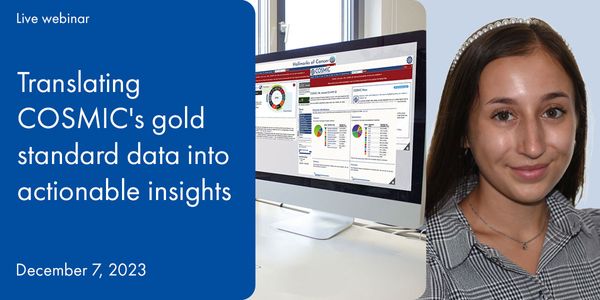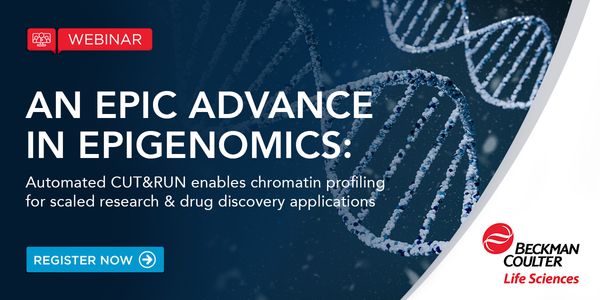Gene Regulation
Gene Regulation is created by using mechanisms to inhibit or induce the expression of a gene product. Regulation of a gene can include: the binding of proteins to DNA elements in order to regulation of transcription, structural changes, chemical changes, or the translation of mRNA.
-
DEC 07, 2023 | 8:00 AMAs the vast landscape of genetic oncology continues to expand, the ability to understand and utilize the full potential of this rich data becomes increasingly challenging. As a result, resea...NOV 09, 2023 | 6:00 AMIn this talk we will explore the application of Multiplexed Error-Robust Fluorescence in situ Hybridization (MERFISH) technology to decode spatially regulated disease drivers in human heart...OCT 26, 2023 | 8:00 AMIn the era of advanced biotechnology, automation plays a crucial role in accelerating cancer research. Next-generation sequencing (NGS) technology has revolutionized cancer research, but lab...Speaker: Nicholas Lodato, Ph.D. , Enrique Neumann, Ph.D.Sponsored By: Beckman Coulter Life SciencesOCT 24, 2023 | 10:00 AMDynamic changes in chromatin drive gene expression programs during cellular development and contribute to pathological changes underlying disease. To date, efforts to characterize chromatin...OCT 24, 2023 | 8:00 AMTo bring your cutting-edge cell and gene therapies to the patients that need them as quickly as possible, you need access to the most knowledgeable scientists, innovative technologies, metho...Phosphorylation of α-synuclein at the Serine-129 site (α-syn Ser129P) is an established pathologic hallmark of synucleinopathies and a therapeutic target. In physiologic states,...Speaker: Dr. Leonardo Parra-RivasPresented at: GenScript 3rd Annual Gene and Cell Engineering Summit
Chimeric antigen receptor (CAR)-reprogrammed immune cells offer exciting therapeutic potential for addressing oncology, autoimmune diseases, transplant medicine, and infections. However, cur...
Speaker:
Dr. Dimitrios L. Wagner
Presented at: GenScript 3rd Annual Gene and Cell Engineering Summit
JUL 20, 2023 | 8:00 AM
Single-cell ATAC-seq (Assay for Transposase-Accessible Chromatin using sequencing, scATAC-seq) is a relatively new and powerful technique that allows researchers to identify open chromatin r...
JUN 27, 2023 | 11:00 AM
C.E. CREDITS
Cancer is a leading cause of death worldwide, accounting for nearly 10 million deaths in 2020, or nearly one in six deaths, according to the World Health Organization. Many cancers can be cu...
JUN 15, 2023 | 9:00 AM
Advancements in protein and gene therapy research have led to more complex modalities being developed. In addition, the desire for a deeper understanding of these molecules enhances the need...
APR 11, 2023 | 8:00 AM
Date: April 11, 2023 Time: 8:00am (PDT), 11:00am (EDT), 5:00pm (CEST) Duchenne muscular dystrophy is caused by mutations in the dystrophin encoding DMD gene that disrupt the reading frame. M...
MAR 30, 2023 | 8:00 AM
Date: March 30, 2023 Time: 8:00am (PST), 11:00am (EST), 5:00pm (CET) Join the Gibco Cell Culture Heroes webinar featuring Heather Beasley, PhD as she presents "SLC25A46 as a Novel Mitoc...
DEC 07, 2022 | 9:00 AM
Date: December 07, 2022 Time: 9:00am (PST), 12:00pm (EST), 6:00pm (CET) Join us for an exciting live panel webinar, as we celebrate the 60th anniversary of Gibco Cell Culture. The panelists...
Speaker:
Jessica Hess
, Rukia Henry
, Ernesto Goulart
, Ameet Chimote, PhD
Sponsored By: Thermo Fisher Scientific/Gibco
NOV 08, 2022 | 8:00 AM
Date: November 08, 2022 Time: 8:00am (PST), 11:00am (EST), 5:00pm (CEST) While flow cytometry shines by its flexibility, it requires a high level of expertise in antibody panel development,...
SEP 27, 2022 | 10:00 AM
Date: September 27, 2022 Time: 10:00am (PDT), 1:00pm (EDT), 7:00pm (CEST) Alzheimer’s disease is the most common cause of dementia and the seventh leading cause of death in the United...
AUG 16, 2022 | 11:00 AM
Date: August 16, 2022 Time: 11:00am (PDT), 2:00pm (EDT), 8:00pm (CEST) Understanding genomic variation in the context of cancer is paramount to identifying disease drivers and informing pers...
JUN 30, 2022 | 9:00 AM
Date: June 30, 2022 Time: 9:00am (PDT), 12:00pm (EDT), 6:00pm (CEST) Subclinical acute rejection (SubAR) is a significant risk for kidney transplant recipients, affecting 1 in 4 patients. Ea...
The global pandemic has increased focus and scrutiny on molecular diagnostic assay development, resulting in a need for assays that provide quick results while delivering expected performanc...
Speaker:
Olivier Bricaud, PhD
Wastewater samples are challenging substrates for nucleic acid extraction, and choice of extraction method will determine the success of downstream analysis. Extraction methods must be able...
Speaker:
Jonathan Shaffer, PhD, MBA
, Dominic O'Neil, MS, MBA
The Sarbecoviruses encodes a large panel of highly heterogeneous, but related zoonotic, epidemic and pandemic coronaviruses that include SARS-CoV and SARS-CoV2, which have been associated wit...
The global pandemic has increased focus and scrutiny on molecular diagnostic assay development, resulting in a need for assays that provide quick results while delivering expected performanc...
Speaker:
Olivier Bricaud, PhD
MicroRNAs (miRNAs) are small RNAs with an average size of 22 nucleotides that regulate gene expression through various mechanisms. During the last decade, researchers have identified over 26...
Speaker:
Samuel Rulli, PhD
Regardless of method, single cell RNA-seq only captures a small fraction of the transcriptome of each cell. Often, this is due to inherent limitations of the methodology as reads ‘drop...
Speaker:
Dante DeAscanis























